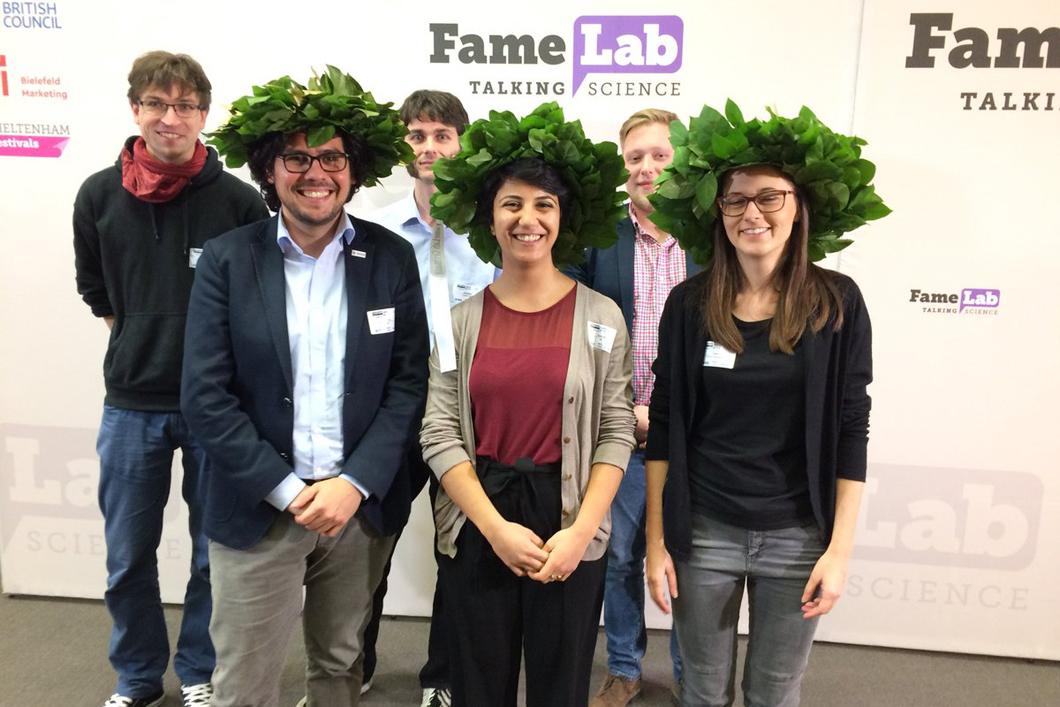
Carineh Ghafafian of the Mechanics of Polymers division (front centre) and Carlos Enrique Abad Andrade of the Inorganic Reference Materials division (front left) have qualified for the FameLab Germany final.
Source: H. Hecht, GFZ German Research Centre for Geosciences
Two BAM researchers won the regional preliminary round of the 2018 FameLab Germany competition for the Berlin/Brandenburg region: Carineh Ghafafian of the Mechanics of Polymers division and Carlos Enrique Abad Andrade of the Inorganic Reference Materials division both qualified for the FameLab Germany final in Bielefeld on the 14th of May.
In the competition young scientists have three minutes to present their current research in an entertaining way. Carlos Abad explained to the audience how hungry isotope twins can help determine the origin of our wine. Carineh Ghafafian tried to convince the jury with her presentation about first aid for wind turbine rotor blades.
Carineh Ghafafian, Carlos Abad, what was your biggest challenge in participating in the competition?
Carineh Ghafafian: That you have to present a scientific topic comprehensibly in just 3 minutes and, in addition, to a diverse audience. That was something new and very challenging for me. I like to give presentations, but I have never tried something like this. After I found an idea, however, the rest was pretty easy.
Carlos Abad: Yes, the most complicated thing is reduction. We have an interdisciplinary approach to our work. There are physicists, chemists, geologists and so on. I was wondering, 'How can one summarise all of that and make it a good story?' That was very complicated.
This type of presentation requires a great deal of simplification. Does that bother you sometimes?
Carlos Abad: No, that does not bother me at all. It's like talking to friends. If I want to go into details, I write a discourse or a scientific paper. I'm really pleased when someone says, 'Oh, okay, I finally got it'. I think that's very important.
Carineh Ghafafian: Yes, I agree. I am satisfied when I can explain my topic clearly so that everyone understands it and that is precisely why I liked this competition from the start.
How did you prepare for your presentation?
Carlos Abad: I have many friends who are not chemists and have no idea about science and keep asking me what I'm doing. I’ve practiced with them. I've had the idea for some time that isotopes are like two people dancing. That's a good idea to simplify matters. One can then imagine atoms as people.
Carineh Ghafafian: I've been thinking for a long time about how to tackle the topic. I tried to start from different angles. But you often have to use too many difficult words. If you start with the big picture that everyone knows, it works. Everyone knows wind turbines, everyone knows rotor blades. And then I can drill into the details.
Are you excited about the final in Bielefeld?
Carlos Abad: Yes of course. About 1000 people are expected to come to the German final. That's more than the final in England. I really like it.
Carineh Ghafafian: I have never spoken to such a large audience. But I am really looking forward to it and to the atmosphere. Everyone is very enthusiastic and wants to learn something new and that's pretty unique, I would say.
About FameLab
FameLab is a global science communication competition for students in science and engineering developed by the British Council. Under the motto "Talking science", the young scientists must explain to the audience in just three minutes in as entertaining a manner as possible what they are researching. As an aid, all items are allowed that they can carry onto the stage, except for PowerPoint presentations and posters. A jury of experts judge the presentations according to three criteria, content, clarity and charisma. The world-wide competition takes place in 35 countries. The winners from the respective countries compete in the global competition at the Cheltenham Science Festival in England.


